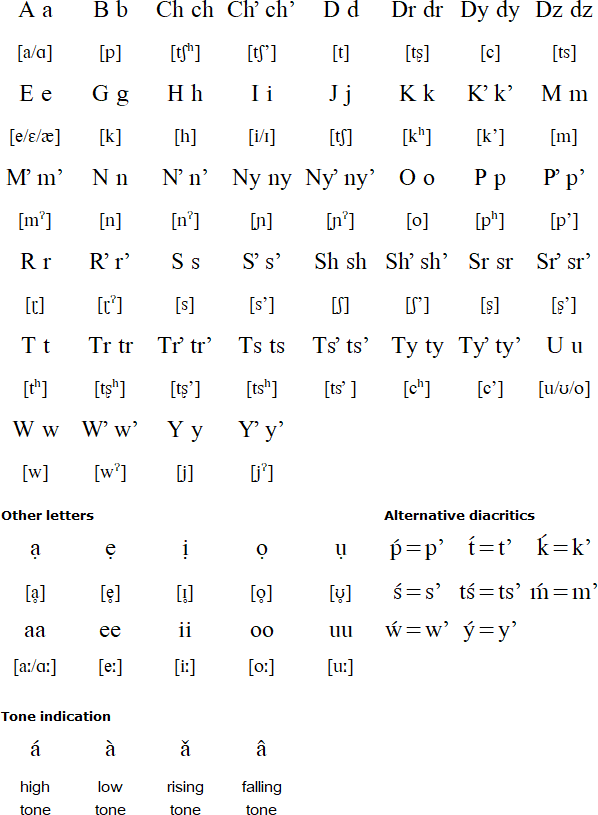Keres is a language isolate spoken by the Keres Pueblo people of northern New Mexico in the USA. In 2007 about 10,670 people spoke Keres, which is also known as Keresan. Linguists have tried to connect Keres with other languages, such as the Hokan, Siouan and Iroquoian languages. However, further research found that Keres is not related to any of these language familes.
There are seven Keres pueblos, each of which speak a different dialect of the language. Neighbouring dialects are mutually intelligible. The dialects are classified into Western and Eastern groups. The Western group includes the Acoma and Laguna pueblos, and the Eastern group includes the pueblos of Cochiti, San Felipe, Santa Domingo, Zia and Santa Ana.
Source: Ethnologue
There is a belief among Keres speakers that their language is sacred and must only be spoken, and not written. Orthographies have, however, been devised for the K'awaika dialect of Laguna Pueblo and the Áakʼu dialect of Acoma Pueblo. The alphabet chart below shows the Acoma orthography.
Keres is in schools in Laguna, Zia and Cochiti pueblos. There are also language revitalzation programs in Acoma, Cochiti and Laguna pueblos. An online dictionary of Acoma Keres was compiled between 2016 and 2018, and other materials are being developed to document and teach the language.

Download an alphabet chart for Keres (Excel)
Ái dítʼîishu srbígà kʼánâaya dyáʼâʼu. Shʼée srbígà ái dyěitsị ái náyáa shdyɨ dyáʼa.
Source: https://en.wikipedia.org/wiki/Keres_language
Information about Keres | Numbers
Information about the Keres language
https://en.wikipedia.org/wiki/Keres_language
https://www.ethnologue.com/language/kjq
http://www.native-languages.org/keres.htm
https://keres.co
Adaizan, Ainu, Basque, Burushaski, Candoshi-Shapra, Chitimacha, Eskayan, Hadza, Haida, Karuk, Kawésqar, Keres, Kuot, Kusunda, Kutenai, Natchez, Nihali, Nivkh, Páez, Purepecha, Sandawe, Seri, Sumerian, Tartessian, Ticuna, Tiwi, Tonkawa, Tunica, Urarina, Waorani, Warao, Wardaman, Washo, Yaghan, Yele, Yuchi/Euchee, Zuni
Languages written with the Latin alphabet
Page last modified: 14.04.24
[top]
You can support this site by Buying Me A Coffee, and if you like what you see on this page, you can use the buttons below to share it with people you know.

If you like this site and find it useful, you can support it by making a donation via PayPal or Patreon, or by contributing in other ways. Omniglot is how I make my living.
Note: all links on this site to Amazon.com, Amazon.co.uk
and Amazon.fr
are affiliate links. This means I earn a commission if you click on any of them and buy something. So by clicking on these links you can help to support this site.
[top]